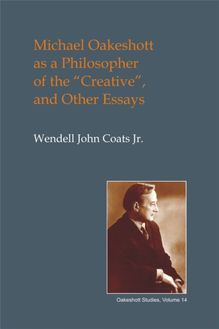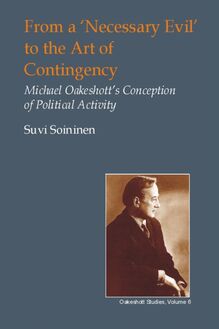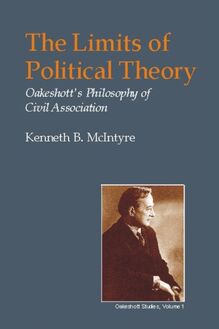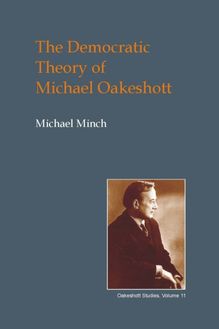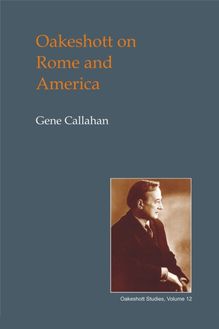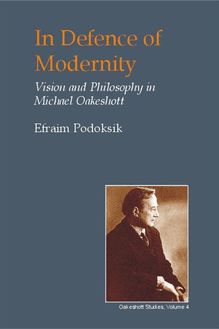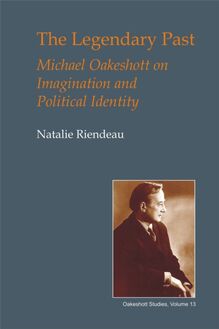-
 Univers
Univers
-
 Ebooks
Ebooks
-
 Livres audio
Livres audio
-
 Presse
Presse
-
 Podcasts
Podcasts
-
 BD
BD
-
 Documents
Documents
-
- Cours
- Révisions
- Ressources pédagogiques
- Sciences de l’éducation
- Manuels scolaires
- Langues
- Travaux de classe
- Annales de BEP
- Etudes supérieures
- Maternelle et primaire
- Fiches de lecture
- Orientation scolaire
- Méthodologie
- Corrigés de devoir
- Annales d’examens et concours
- Annales du bac
- Annales du brevet
- Rapports de stage
La lecture à portée de main
Vous pourrez modifier la taille du texte de cet ouvrage
Découvre YouScribe en t'inscrivant gratuitement
Je m'inscrisMichael Oakeshott, the Ancient Greeks, and the Philosophical Study of Politics , livre ebook
Découvre YouScribe en t'inscrivant gratuitement
Je m'inscrisEn savoir plus
Vous pourrez modifier la taille du texte de cet ouvrage
En savoir plus

Description
Sujets
Informations
| Publié par | Andrews UK |
| Date de parution | 20 juillet 2016 |
| Nombre de lectures | 0 |
| EAN13 | 9781845408688 |
| Langue | English |
Informations légales : prix de location à la page 0,0000€. Cette information est donnée uniquement à titre indicatif conformément à la législation en vigueur.
Extrait
Title page
Michael Oakeshott, The Ancient Greeks, and the Philosophical Study of Politics
Eric Steven Kos
imprint-academic.com
Publisher information
2016 digital version converted and published by
Andrews UK Limited
www.andrewsuk.com
Copyright © Eric Steven Kos, 2007
The moral rights of the author have been asserted.
No part of this publication may be reproduced in any form without permission, except for the quotation of brief passages in criticism and discussion.
Imprint Academic
PO Box 200, Exeter EX5 5YX, UK
imprint-academic.com/idealists
Epigraph
Unless we know what philosophy is, unless we have a clear conception of its aims and results, the history of philosophy must remain a blank, a sealed book, a mere repertory of dead and unprofitable dogmas.
James Frederick Ferrier
Lectures on Greek Philosophy (1866, I:1).
Acknowledgements
It is perhaps odd to acknowledge a debt to the object of one’s research, though if the focus is remarkable human beings, it is perhaps more understandable. Michael Oakeshott is one such remarkable individual, not least for his generosity. His elegant prose invited me in and his unostentatious erudition and insight made me stay. I had the good fortune to visit him on the Dorset coast in the spring of 1990. I was regretfully too young to appreciate the full opportunity presented. Nevertheless I was warmly met and treated to the patient, thoughtful conversation and delicious soup for which he has come to be known. I doubt I could have done better in having Oakeshott as a touchstone for my thought and work.
I have been surrounded by excellent individuals throughout this particular project. This revised version of my Ph.D. thesis at the University of Michigan would not have been possible without the help and critical feedback of Arlene W. Saxonhouse, Edwin M. Curley, Mika T. LaVaque-Manty, and Timothy Fuller. Arlene Saxonhouse was a model mentor, both as editor and in providing a fantastic apprenticeship to her own research and writing. Timothy Fuller’s inspiration and critical encouragement predates even my acquaintance with Oakeshott’s work.
I would not have been able to do the initial research without the financial support of the Earhart Foundation, which allowed me to work on the Oakeshott archives at the London School of Economics and Political Science in the fall of 2001.
I have benefited from numerous discussions with colleagues and mentors throughout this process, chief among them are Arlene W. Saxonhouse, Kimberly K. Smith, Edward Clayton, and Todd Breyfogle, the latter of whom initially introduced me to the work of Michael Oakeshott. Early feedback from the lively and thoughtful participants in the Michael Oakeshott Association was also invaluable. I cannot begin to measure the significance of the conversations I have had with these individuals. My thanks also go to Noël K. O’Sullivan and Keith Sutherland at Imprint Academic. I benefited greatly from their professionalism and concise and thoughtful advice.
Finally, I owe a debt too great to measure for the love and support of my wonderful family. They have sacrificed and lent encouragement at critical times along the way. My wife Shannon especially deserves note. She not only provided technical assistance throughout the writing, but her persistent encouragement and love have been, and continue to be, a wellspring that sustains me.
Abbreviations
CL
‘A Philosophical Approach to Politics: My First Course of Lectures’, LSE File 1/1/7
CPJ
‘The Concept of a Philosophical Jurisprudence’, Politica , 3:203–22, 345–60
EGP
Notebook titled ‘Early Greek Philosophy’, LSE File 2/4/1
EM
Experience and Its Modes (Cambridge University Press, 1933)
LSE
Lectures in the History of Political Thought (Imprint Academic, 2006)
MPME
Morality and Politics in Modern Europe (Yale University Press, 1993)
OHC
On Human Conduct (Clarendon Press, 1975)
Rep I, II
Notebooks on the Republic , LSE Files 2/2/1–2
RIP
Rationalism in Politics (Liberty Fund, 1991)
RPML
Religion, Politics and the Moral Life (Yale University Press, 1993)
VLL
The Voice of Liberal Learning (Yale University Press, 1989)
I. Oakeshott and the Project in the Notebooks
Introduction
What exactly is it we are doing when we as teachers read and discuss with students some memorable work in the history of political thought? This has been an animating question for my thinking and this work. It is what initially drew me to the work of Michael Oakeshott, for it was a central concern of his as well. Oakeshott’s unique response to the question ‘What is political philosophy?’ can help us puzzle through what would be a meaningful answer to this question. More particularly through an exploration of Oakeshott’s confrontation with the beginnings of political philosophy, in the ancient Greeks, his unique vision of political philosophy emerges. [1] This conception of the character of political philosophy, though inspired by and deeply indebted to the ancient Greeks, is a distinctly modern view. It is a view that helps us work through the variety of meanings given to the term ‘political theory’ and to confront a series of contemporary challenges to the study of the history of political thought and to the study of ‘great books’ more generally. By considering how Oakeshott confronted the question of the origins of political philosophy, one can clarify the nature of the discipline and be better placed, as a result, to assess the character and value of the whole Western tradition of political thought.
The Value of the Notebooks
In his introduction to Hobbes’s Leviathan , Oakeshott identified three broad traditions or patterns within the history of political thought. The supreme expression of these three traditions he found in three ‘masterpieces’ of political theory, which are respectively Plato’s Republic , Hobbes’s Leviathan and Hegel’s Philosophy of Right . The first tradition, represented by Plato’s Republic , has as its master-conceptions those of Reason and Nature. The second, represented by Hobbes’ Leviathan , also “springs from the soil of Greece” and has as its master conceptions Will and Artifice. The third, which did not appear until the eighteenth century, is represented by Hegel’s Philosophy of Right , and has as its master-conception the Rational Will ( RIP 227–28). Although the influence of Hobbes and Hegel on Oakeshott’s thought has been given substantial treatment in the critical literature, the influence of Plato has not been accorded similar treatment. A set of notebooks kept by Oakeshott, that have recently been made available for scholarship, helps to remedy this absence and to show why Oakeshott thought Plato’s Republic was among the greatest works in the larger history of political thought.
The almost two dozen notebooks, used as primary sources for this project, are small notebooks written in Oakeshott’s hand and used to record his thoughts on all kinds of different subjects throughout his life. A few are specifically dedicated to particular authors and particular works. There are lengthy notebooks on early Greek philosophers, on Plato’s Republic , on Aristotle’s Ethics and Politics and on Spinoza’s writings. The early Greek philosophy notebook, the Plato notebooks and the Aristotle notebooks are the primary ones I have relied upon. These notebooks are mostly Oakeshott’s own commentaries, but he also made extensive use of other commentaries and recorded passages from those works. He also made frequent cross-references to other notebooks and to other works he had read or was reading at the time.
One reason Plato’s position in Oakeshott’s thought is less clear than that of other philosophers who have influenced him is the qualified treatment Oakeshott himself gives to Plato in his published writings. In the instances Oakeshott endorses Plato’s thinking, he inevitably offers a strong critique as well. The clearest example of this positive and then negative treatment of Plato is in Oakeshott’s rendition of Plato’s cave allegory in On Human Conduct (1975, 27–31), which I shall give a good deal of attention to below. The same criticism is not equally evident in Oakeshott’s rather extensive scholarship on Hobbes or his brief treatments of Hegel.
The notebooks show the influence and importance Plato had for Oakeshott an influence only fleetingly glimpsed in the few references Oakeshott made to Plato in his published work. Searching for ‘influences’ is a precarious if not nefarious preoccupation. But, when the endeavor is not the marshalling authorities but an attempt to show what one theorist found of interest and relevance in another, the endeavor can be quite instructive. What can be gained by this search is a clearer understanding of what may be relevant in the history of political philosophy through a careful following of another’s search for relevance. In the case of the ancient Greek thinkers, the character of political philosophy is thrown into sharper relief than it is with Hobbes or Hegel, both of whom, despite their diff
-
 Univers
Univers
-
 Ebooks
Ebooks
-
 Livres audio
Livres audio
-
 Presse
Presse
-
 Podcasts
Podcasts
-
 BD
BD
-
 Documents
Documents
-
Jeunesse
-
Littérature
-
Ressources professionnelles
-
Santé et bien-être
-
Savoirs
-
Education
-
Loisirs et hobbies
-
Art, musique et cinéma
-
Actualité et débat de société
-
Jeunesse
-
Littérature
-
Ressources professionnelles
-
Santé et bien-être
-
Savoirs
-
Education
-
Loisirs et hobbies
-
Art, musique et cinéma
-
Actualité et débat de société
-
Actualités
-
Lifestyle
-
Presse jeunesse
-
Presse professionnelle
-
Pratique
-
Presse sportive
-
Presse internationale
-
Culture & Médias
-
Action et Aventures
-
Science-fiction et Fantasy
-
Société
-
Jeunesse
-
Littérature
-
Ressources professionnelles
-
Santé et bien-être
-
Savoirs
-
Education
-
Loisirs et hobbies
-
Art, musique et cinéma
-
Actualité et débat de société
- Cours
- Révisions
- Ressources pédagogiques
- Sciences de l’éducation
- Manuels scolaires
- Langues
- Travaux de classe
- Annales de BEP
- Etudes supérieures
- Maternelle et primaire
- Fiches de lecture
- Orientation scolaire
- Méthodologie
- Corrigés de devoir
- Annales d’examens et concours
- Annales du bac
- Annales du brevet
- Rapports de stage
